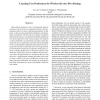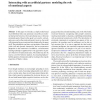458 search results - page 77 / 92 » Q-Decomposition for Reinforcement Learning Agents |
ATAL
2004
Springer
14 years 1 months ago
2004
Springer
The problem of interest is how to dynamically allocate wireless access services in a competitive market which implements a take-it-or-leave-it allocation mechanism. In this paper ...
ICCBR
2001
Springer
14 years 3 days ago
2001
Springer
It is useful for an intelligent software agent to be able to adapt to new demands from an environment. Such adaptation can be viewed as a redesign problem; an agent has some origin...
BC
2008
13 years 7 months ago
2008
In this paper we introduce a simple model based on probabilistic finite state automata to describe an emotional interaction between a robot and a human user, or between simulated a...
ATAL
2006
Springer
13 years 11 months ago
2006
Springer
We study how decentralized agents can develop a shared vocabulary without global coordination. Answering this question can help us understand the emergence of many communication s...
JIRS
2000
13 years 7 months ago
2000
Agents (hardware or software) that act autonomously in an environment have to be able to integrate three basic behaviors: planning, execution, and learning. This integration is man...


